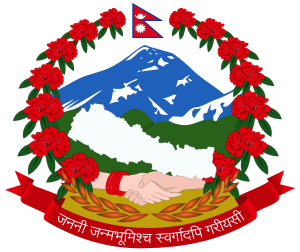Ramesh Bikal
| Ramesh Bikal | |
|---|---|
| Born |
Kartik 29, 1985 (Nepal Sambat) Arubari,Kathmandu, Nepal |
| Parents |
|
Rameshwor Sharma Chalise[1] better known as Ramesh Bikal (Nepali: रमेश बिकल) (born 1932-2008, near Gokarna, Nepal in the Kathmandu Valley) is a Nepalese writer and painter who is known for his works portraying rural life and the lives of common people in Nepal.
He received a B.Ed. in 1960, and worked in education. His early stories had socialist and anti-establishment themes. As a result, he was imprisoned three times between 1949 and 1960. In more recent work, he has focused on sexual relations.[2]
Bikal was the first short story writer to be given the Madan Puraskar award.[2] He received the Daulat Bikram Bista Aakhyan Samman Award in 2008 for six decades of contributions to fiction writing in Nepal.[3]
Works
- Birāno Deshmā ("In an Empty Land"), 1959
- Nayā Sadakko Gīt ("The Song of New Road"), 1962
- 13 Ramālilā Kathāharū ("Thirteen Enjoyable Stories"), 1967
- Āja Pheri Arko Tannā Pherincha ("Today Yet Another Bedspread is Changed"), 1967
- Euṭā Buḍho Violin Āshākavariko Dhunmā ("An Old Violin in the Ashāvari Tune"), 1968
- Agenāko Ḍilmā ("On the Edge of the Hearth"), 1968
- Urmilā Bhāujū ("Sister-in-Law Urmilā"), 1968
- 21 Ramālilā Kathāharū ("Twenty-one Enjoyable Stories"), 1968[2]
References
- ↑ Husain, Mosharaf. "Litterature Ramesh Vikal (1928-2008)". www.mediabd.com. Retrieved 2017-07-31.
- 1 2 3 Himalayan Voices: An Introduction to Modern Nepali Literature (Voices from Asia), edited and translated by Michael J. Hutt, University of California Press, 1991. p. 244. ISBN 9780520910263
- ↑ "Awards". Nepal Creative Writers' Society. Retrieved 2014-07-10.
This article is issued from
Wikipedia.
The text is licensed under Creative Commons - Attribution - Sharealike.
Additional terms may apply for the media files.
